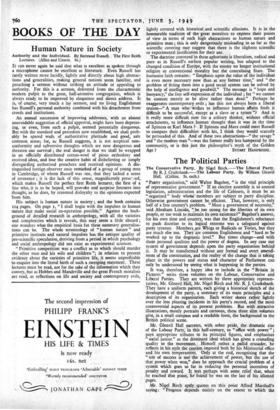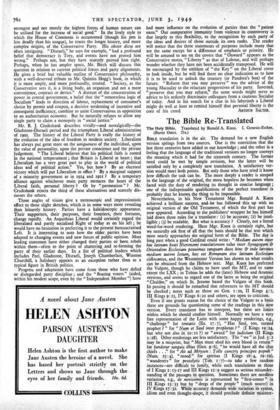The Political Parties
The Conservative Party. By Nigel Birch. The Liberal Party.
By R. J. Cruikshank.—The Labour Party. By William Glenvil Hall. (Collins. 5s. each.)
" PARTY organisation," said Walter Bagehot, "is the vital principle of representative government." If an elective assembly is to control legislation, administration and the life of Cabinets, it must be an " organised " body whose members are subject to party discipline. Otherwise government cannot be efficient. That, however, is only half of a free country's problem. "Must a government of necessity,' said Abraham Lincoln, "be too strong for the liberties of its own people, or too weak to maintain its own existence?" Bagehor's answer, for his own time and country, was that the Englishmen's reluctance to push doctrine to its logical extreme was a safeguard against party tyranny. Members are Whigs or Radicals or Tories, but they are much else too. They are common Englishmen and "hard to be worked up to the dogmatic level." But times change—and with them personal qualities and the power of dogma. In any case our system of government depends upon the party organisation behind it. It may be transformed without any formal and overt amend- ment of the constitution, and the reality of the change that is taking place in the powers and status and character of Parliament can only be understood by seeing what is happening in the parties.
It was, therefore, a happy idea to include in the "Britain in Pictures" series three volumes on the Labour, Conservative and Liberal Parties. They are written by three appropriate represen- tatives, Mr. Glenvil Hall, Mr. Nigel Birch and Mr. R. J. Cruiksharik. They have a uniform pattern, each giving a historical sketch of the development of the party, a summary of its main principles and a description of its organisation. Each writer skates rather lightly over the less pleasing incidents in his party's record, and the most controversial aspects of its present problems. But with attractive illustrations, mostly portraits and cartoons, these three slim volumes give, in a small compass and a readable form, the background to the British political scene.
Mr. Glenvil Hall narrates, with sober pride, the dramatic rise of the Labour Party, in this half-century, to "office with power " ; pays appropriate tributes to its principal figures, and emphasises "social justice" as the dominant ideal which has given a crusading quality to the movement. Himself rather a pallid crusader, he reflects in his style the caution imposed both by his Ministerial office and his own temperament. Only at the end, recognising that the "test of success is not the achievement of power, but the use of that power when won," does he approach the crucial problem of a system which goes so far in reducing the personal incentives of penalty and reward. It was perhaps with some relief that, when he reached that point, he found he was on the last of his allotted pages.
Mr. Nigel Birch aptly quotes on this point Alfred Marshall's saying : "Progress depends mainly on the extent to which the strongest and not merely the highest forces of human nature can be utilised for the increase of social good." In the lively style to which the House of Commons is accustomed (though his pen is less deadly than his tongue), he traces the longer history, and more complex origins, of the Conservative Party. His obiter dicta are Often intriguing. "Disraeli," he says for example, "had a profound belief that democracy is Tory, and events have not proved him wrong." Perhaps not, but they have scarcely proved him right. Perhaps, when he has ampler space, Mr. Birch will discuss this question in relation to current political forces and party alignments. He gives a brief but valuable outline of Conservative philosophy, with a well-deserved tribute to Mr. Quintin Hogg's book, in which it is more amply, and more profoundly, treated. "Society, as the Conservative sees it, is a living body, an organism and not a mere convenience, contract or device." A distrust of the concentration of power in central government, a belief that the "remorseless logic of Socialism" leads to direction of labour, replacement of consumer's choice by permit and coupon, a decisive weakening of incentive and consequent inefficiency, combine to unite Conservatives in opposition to an authoritarian economy. But he naturally refuses to allow any single party to claim a monopoly in "social justice."
Mr. R. J. Cruikshank describes vividly—and nostalgically—the Gladstone-Disraeli period and the triumphant Liberal administration of 1905. The history of the Liberal Party is really the history of the evolution of the idea of freedom in modern society. Liberalism has always put great store on the uniqueness of the individual, upon the value of personality, upon the private conscience and the private Judgement. "The Liberal believes that his political faith is rooted In the national temperament ; that Britain is Liberal at heart ; that Liberalism has a very great part to play in the world of political ideas and of political action." Yes, but how ? By an electoral victory which will put Liberalism in office ? By a marginal support of a minority government as in 1924 and 1921 ? By a temporary alliance against whichever main party menaces the heart of the Liberal faith, personal liberty ? Or by " permeation " ? Mr. Cruikshank rejects the third of these alternatives and scarcely dis- cusses the others.
Three angles of vision give a stereoscopic and impressionistic effect to these slight sketches, which is in some ways more revealing than leisurely history. Parties have a kaleidoscopic appearance. Their supporters' their purposes, their frontiers, their fortunes, change rapidly. An Asquithian Liberal would certainly regard the liberalised and partly socialised Right of today as on his left ; he would have no hesitation in preferring it to the present bureaucratised Left. It is interesting to note how the older parties have been adapted to changing events and new forces of public opinion. Most leading statesmen have either changed their parties or been rebels within them—often to the point of shattering and re-forming the party of their earlier days. In a list of political leaders which mcludes Peel, Gladstone, Disraeli, Joseph Chamberlain, Winston Churchill, a Salisbury appears as an exception rather than as a typical figure in British politics. Progress and adaptation have come from those who have defied or disregarded party discipline ; and the "floating voters" (aided, within his modest scope, even by the "Independent Member ") have had more influence on the evolution of parties than the "patient oxen." Our comparative immunity from violence in controversy is due largely to this flexibility, to the recognition by each party of the ideas and desires of those outside its own ranks. The reader will notice that the three statements of purposes include many that are the same except for a difference of emphasis or priority. He will be amused to see on the covers that " Onward " appears as the Conservative motto, " Liberty " as that of Labour, and will perhaps wonder whether they have not been accidentally transposed. He will be encouraged by the emblem of "the Key" on the Liberal cover to look inside, but he will find there no clear indication as to how it is to be used to unlock the treasury (or Pandora's box) of the future. "Reform that you may preserve" was the advice of the young Macaulay to the reluctant progressives of his party. Inverted, "preserve that you may reform," the same words might serve as advice to his ardently doctrinaire colleagues from a cautious Socialist of today. And in his search for a clue in his labyrinth a Liberal might do well at least to remind himself that personal liberty is the



































 Previous page
Previous page